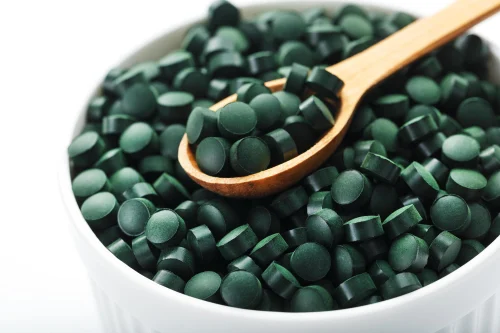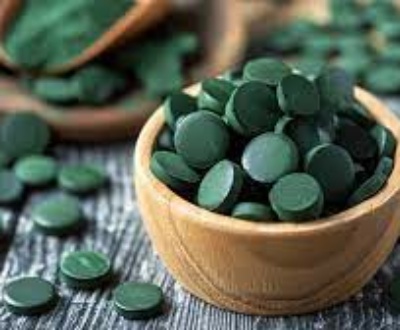How to take Spirulina Powder?

Why and How to Include Spirulina in Your Diet?
In recent years, spirulina has gained significant attention as one of the most potent “superfoods” available. Packed with an impressive array of nutrients, including protein, vitamins, minerals, and antioxidants, spirulina has become a favorite supplement for those looking to boost their health and well-being. Whether you’re aiming to improve your energy, enhance your immune function, or support your fitness goals, spirulina can be a powerful addition to your daily diet. But what exactly is spirulina, why should you include it in your diet, and how can you incorporate it effectively?
In this article, we will explore the numerous health benefits of spirulina, why you should consider adding it to your routine, and practical ways to include this nutrient powerhouse in your meals. From smoothies to snacks and beyond, we’ll show you just how easy and versatile it can be to harness the full potential of spirulina.
What Is Spirulina?
Spirulina is a type of cyanobacteria (blue-green algae) that grows in both fresh and saltwater. It has been consumed for centuries due to its remarkable nutrient profile, which includes high-quality protein, essential vitamins and minerals, antioxidants, and fatty acids. Spirulina is typically sold in dried powder or tablet form and is available as a dietary supplement.
This algae has long been known for its vibrant blue-green color, which comes from its pigments, mainly chlorophyll (for photosynthesis) and phycocyanin (which gives it its blue color). Spirulina thrives in warm, alkaline environments, and is grown in both controlled farms and natural bodies of water worldwide.
Why Should You Include Spirulina in Your Diet?
Spirulina is often called a “superfood” for a reason. Its incredible nutritional density offers a wide range of health benefits, making it an excellent addition to any balanced diet. Let’s explore some of the key reasons to include spirulina in your daily routine.
1. Rich Source of Plant-Based Protein
Spirulina is one of the richest sources of plant-based protein available, containing about 60-70% protein by weight. This makes it an excellent protein option for vegetarians, vegans, or anyone looking to add more plant-based protein to their diet. Unlike many plant proteins, spirulina is a complete protein, meaning it contains all nine essential amino acids, which the body cannot produce on its own.
The protein in spirulina supports muscle growth, tissue repair, and the production of enzymes and hormones. It can be particularly beneficial for athletes, bodybuilders, and those involved in regular physical activity.
2. Packed with Vitamins and Minerals
Spirulina is a powerhouse of essential nutrients. It is particularly rich in B vitamins, including B1 (thiamine), B2 (riboflavin), and B3 (niacin), which are vital for energy production and maintaining healthy skin, eyes, and nervous system. Spirulina also contains vitamin A, vitamin K, iron, magnesium, and calcium—all important for bone health, immune function, and overall vitality.
Here’s a breakdown of some key vitamins and minerals found in spirulina:
- Vitamin B12: Supports energy levels, red blood cell production, and nerve health.
- Iron: Vital for oxygen transport in the blood and energy levels.
- Magnesium: Important for muscle function, nerve signaling, and relaxation.
- Calcium: Key for strong bones and teeth.
- Potassium: Supports heart health, fluid balance, and muscle function.
3. Antioxidant and Anti-Inflammatory Properties
Spirulina is rich in antioxidants, which help protect the body from oxidative stress and free radical damage. Phycocyanin, the blue pigment in spirulina, is a powerful antioxidant that has been shown to have anti-inflammatory properties. Chronic inflammation is linked to a variety of health conditions, including heart disease, arthritis, and diabetes.
By reducing inflammation and neutralizing free radicals, spirulina can help protect your cells from damage and support long-term health. Additionally, spirulina contains beta-carotene and chlorophyll, both of which further boost its antioxidant capacity.
4. Supports Immune Function
Spirulina has been shown to enhance immune function by stimulating the production of white blood cells, which help fight off infections. It also contains gamma-linolenic acid (GLA), an omega-6 fatty acid with anti-inflammatory and immune-boosting properties. Regular consumption of spirulina can help strengthen your immune system, especially in times of stress, illness, or fatigue.
5. Helps Detoxify the Body
Spirulina has detoxifying properties due to its ability to bind to heavy metals, toxins, and free radicals, helping to eliminate them from the body. Chlorophyll, a key compound in spirulina, helps cleanse the liver and digestive tract by facilitating the removal of toxins and promoting better digestion. For those who live in polluted environments or are exposed to heavy metals through food or water, spirulina can help detoxify and purify the body.
6. Supports Heart Health
Spirulina can contribute to heart health by lowering levels of LDL cholesterol (the “bad” cholesterol) and triglycerides while boosting HDL cholesterol (the “good” cholesterol). Studies have shown that spirulina can improve lipid profiles and may help lower blood pressure, thus reducing the risk of cardiovascular diseases. Additionally, its antioxidant and anti-inflammatory properties help protect the cardiovascular system from damage caused by oxidative stress and inflammation.
7. Helps with Weight Management
Spirulina is low in calories but rich in protein, making it an excellent addition to a weight management plan. The protein content of spirulina helps curb hunger, control appetite, and reduce overall calorie intake. It also supports metabolic health and may improve fat metabolism. By boosting energy and improving muscle recovery after exercise, spirulina can assist in maintaining a healthy weight, especially when combined with a balanced diet and regular physical activity.
8. Improves Gut Health
The fiber and nutrients in spirulina support gut health by promoting the growth of beneficial gut bacteria. A healthy gut microbiome is essential for proper digestion, immune function, and overall health. Spirulina may help improve digestion, reduce bloating, and support regular bowel movements. It also has a mild prebiotic effect, which can help nourish beneficial bacteria in the intestines.
How to Include Spirulina in Your Diet
Now that we’ve explored the many reasons to include spirulina in your diet, let’s dive into practical ways to incorporate this nutrient-dense algae into your daily meals. While spirulina is most commonly consumed in powder or tablet form, its versatility allows you to use it in a wide variety of dishes.
1. Add Spirulina to Smoothies
One of the easiest and most popular ways to consume spirulina is by adding it to your smoothies. Spirulina powder has a slightly earthy, oceanic flavor, which pairs well with fruit-based smoothies. Simply add a teaspoon or two of spirulina to your smoothie along with fruits like bananas, berries, or mangoes, and your favorite greens (like spinach or kale). You can also add plant-based protein powders, almond milk, and a handful of nuts or seeds for added nutrition.
Example Smoothie Recipe:
- 1 banana
- 1 cup spinach
- 1/2 cup blueberries
- 1 teaspoon spirulina powder
- 1 tablespoon chia seeds
- 1 cup coconut water or almond milk
2. Spirulina Energy Balls or Bars
Spirulina can be used to create healthy and nutrient-packed snacks like energy balls or bars. Combine spirulina powder with ingredients like oats, dates, nuts, and seeds for a delicious, on-the-go snack. These energy-packed bites can provide a natural energy boost, making them perfect for a pre-workout snack or midday pick-me-up.
Example Energy Ball Recipe:
- 1 cup oats
- 1/2 cup almond butter
- 1/4 cup chia seeds
- 2 tablespoons spirulina powder
- 1/4 cup honey or maple syrup
- 1/4 cup water
Mix all ingredients together, form into small balls, and refrigerate for an hour before enjoying.
3. Sprinkle Spirulina on Salads
Another simple way to include spirulina in your diet is by sprinkling it over salads. You can combine spirulina powder with lemon juice, olive oil, and your favorite seasonings to create a tangy dressing. The spirulina adds an earthy flavor and a nutrient boost to your fresh greens.
4. Add Spirulina to Soups and Stews
For a more savory take on spirulina, add it to soups or stews. Stir it in during the final stages of cooking to preserve its nutrients. It pairs well with vegetable soups, miso soups, or any broth-based dishes. The flavor of spirulina will blend seamlessly with the other ingredients while adding a burst of nutrition.
5. Make Spirulina Shots
For a quick and easy way to get your daily dose of spirulina, mix a teaspoon of spirulina powder with water, lemon juice, and a pinch of sea salt for a refreshing health shot. You can drink this first thing in the morning or after a workout to boost your energy levels and hydration.
6. Spirulina in Baked Goods
If you’re into baking, you can incorporate spirulina powder into muffins, pancakes, or energy bars. The earthy flavor pairs well with other ingredients like coconut, cacao, and nuts, and it adds a vibrant green color to your baked goods. Just be sure not to add too much spirulina, as the flavor can become overpowering if used in excess.
7. Spirulina Capsules or Tablets
If you’re not a fan of the taste of spirulina, you can opt for spirulina in capsule or tablet form. These are easy to swallow with water and are a convenient option for those on the go.
Conclusion
Spirulina is a versatile, nutrient-dense superfood that can offer a wide range of health benefits when included in your diet. Whether you’re looking to increase your protein intake, improve energy levels, or support your immune system, spirulina is a powerful addition to a balanced, health-conscious lifestyle. By incorporating spirulina into smoothies, snacks, salads, and more, you can easily unlock its potential and give your body a nutrient boost every day.
As with any supplement or dietary change, it’s important to start gradually and consult with a healthcare provider, especially if you have underlying health conditions or are pregnant or breastfeeding. But for most people, spirulina is a safe and effective way to enhance overall health and well-being. So, why not give spirulina a try and see how this incredible superfood can transform your diet?
Subscribe to our Newsletter.
Keep Reading
See all posts
Terms | Privacy | Disclaimer
© 2012-23 Kalptaru Agro. All Rights Reserved



